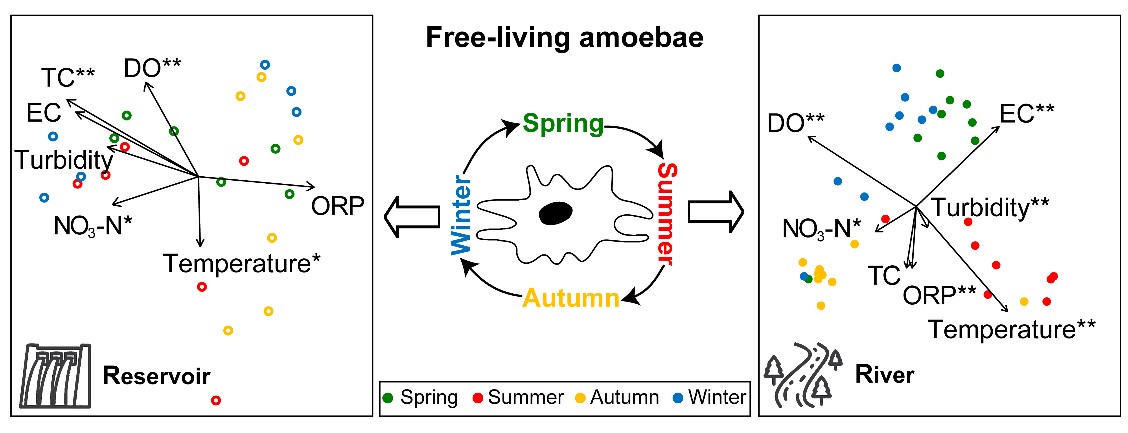Free-living amoebae are single-celled eukaryotic microorganisms, widely distributed both in natural and man-made aquatic ecosystems, and they play key roles in water purification and in biogeochemical cycling and fertility maintenance of aquatic and terrestrial ecosystems. They feed on various microorganisms including fungi and bacteria, and constitute significant links in microbial food webs in water and soil. Most amoebae are able to form cysts allowing them to survive adverse conditions. When favorable conditions resume, the amoebae can excyst and revert to the active feeding stage. The cysts can remain viable for years, which allow amoebae to be very resilient to diverse and changing environmental conditions. The composition of amoeba communities varies between seasons in drinking water treatment system, but mechanisms that mediate seasonal variation in community structure have not been well investigated. Similarly, most studies of amoeba communities have focused on a single type of habitat, while the variation in composition of free-living amoeba communities between habitats remains poorly understood.
The Aquatic Ecohealth Group (Jun Yang’s research team) together with Christopher Rensing and Regin Ronn, Institute of Urban Environment, Chinese Academy of Sciences, selected different habitat waters (including reservoirs and rivers) according to urban-to-rural gradient, extending from urban sites to more rural sites in a subtropical city. A total of 108 surface water samples were collected on a seasonal basis from four reservoirs and two rivers in Xiamen city, subtropical China. They used high throughput sequencing and qPCR methods to explore the occurrence and abundance of free-living amoebae. In total, 335 amoeba OTUs were detected, and only 32 OTUs were shared by reservoir and river habitats. The reservoirs and rivers harbored unique amoebae communities and exhibited distinct seasonal patterns in community composition. Moreover, the temporal patterns of amoebae communities were significantly associated with water temperature, indicating that temperature is an important variable controlling the ecological dynamics of amoebae populations. However, further comparative analysis indicated that both environmental selection, and neutral processes, significantly contributed to amoeba community assembly. The genera detected here include pathogenic species and species that can act as vectors for microbial pathogens, which can cause human infections. Overall, the results of this study suggest that the free-living amoeba communities are more affected by habitat (river vs. reservoir) than by the season in these subtropical aquatic ecosystems. The results also indicate that abiotic factors, in particular water temperature, play an important role in amoeba ecology. Both environmental selection and neutral processes play important roles in the community assembly, while the stochastic processes were more important for shaping the communities of free-living amoebae in reservoir than in river.
The result of the study published in an international journal of environmental science. Water Research, 2018,146: 177–186 (Category 1, IF=7.051) (Kexin Ren, Yuanyuan Xue, Regin Ronn, Lemian Liu, Huihuang Chen, Christopher Rensing*, Jun Yang*. Dynamics and determinants of amoeba community, occurrence and abundance in subtropical reservoirs and rivers). This study was supported by National Natural Science Foundation of China, the Xiamen Municipal Bureau of Science and Technology, and Fujian 100 talents program to Christopher Rensing.
